Baidu adheres to the talent philosophy of "recruiting the best employees, providing the largest growth space, focusing on the final results, paying for the value creation, and making the exceptional climbers stand out".We value employees different needs from aspects of the ion, cultivation, utilization, and retention of talents. From material security (survival and sense of security)to mental satisfaction (sense of belongings and being respected), and to the cultivation of the "super employees"(self-fulfillment), Baidu has made all-round efforts and innovation to make exceptional "climbers" standing out. At the same time, Baidu follows the concept of sustainable talent development to implement forward-looking strategies of talent reserves and builds an enabling environment for talent cultivation. By doing so, we create a more mature talent supply chain, thus realizing a mutually beneficial symbiosis between the individual, the organization, and society.
As for talent cultivation, Baidu has a clear hierarchical governance mechanism:
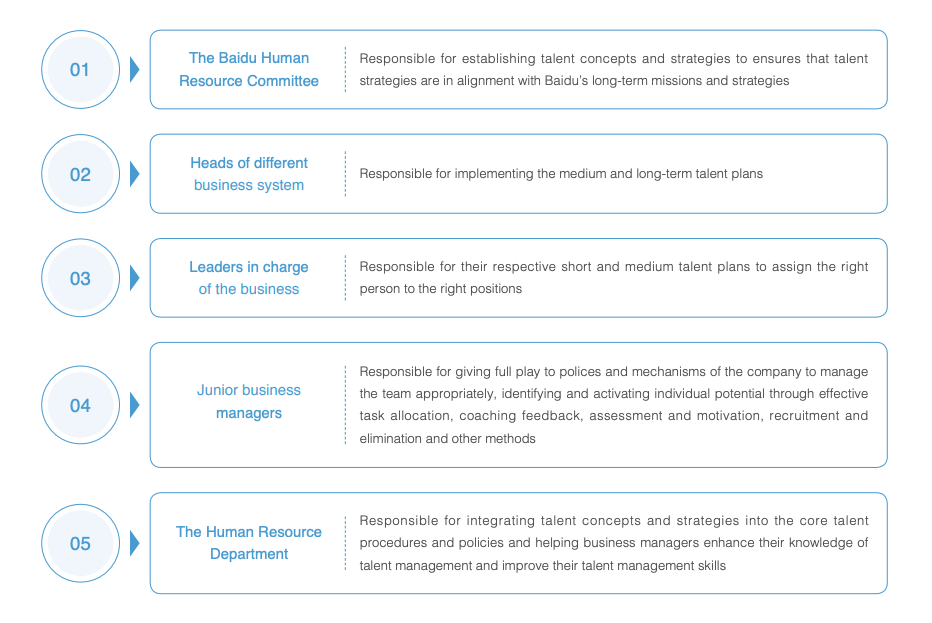
Baidu Talent Cultivation Platform and Cultivation Mechanism
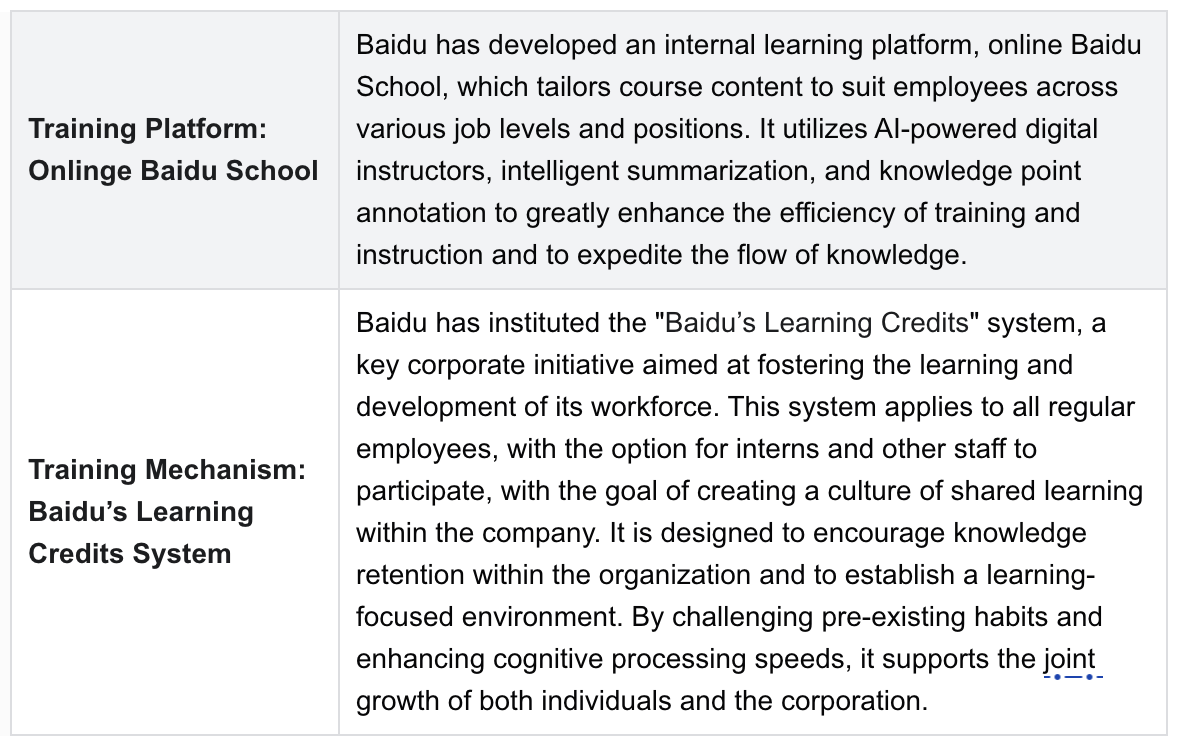
Baidu is committed to ensuring equal training opportunities for everyone. To support female managers, Baidu has established the Baidu Womens Leadership Forum, which aims to help female employees achieve better career development. For employees from different countries, regions, ethnicities, and genders, Baidu has created a learning module titled "Inclusive Baidu Workplace Culture" on Duxuetang, the online Baidu School, to foster an equitable and inclusive work environment.
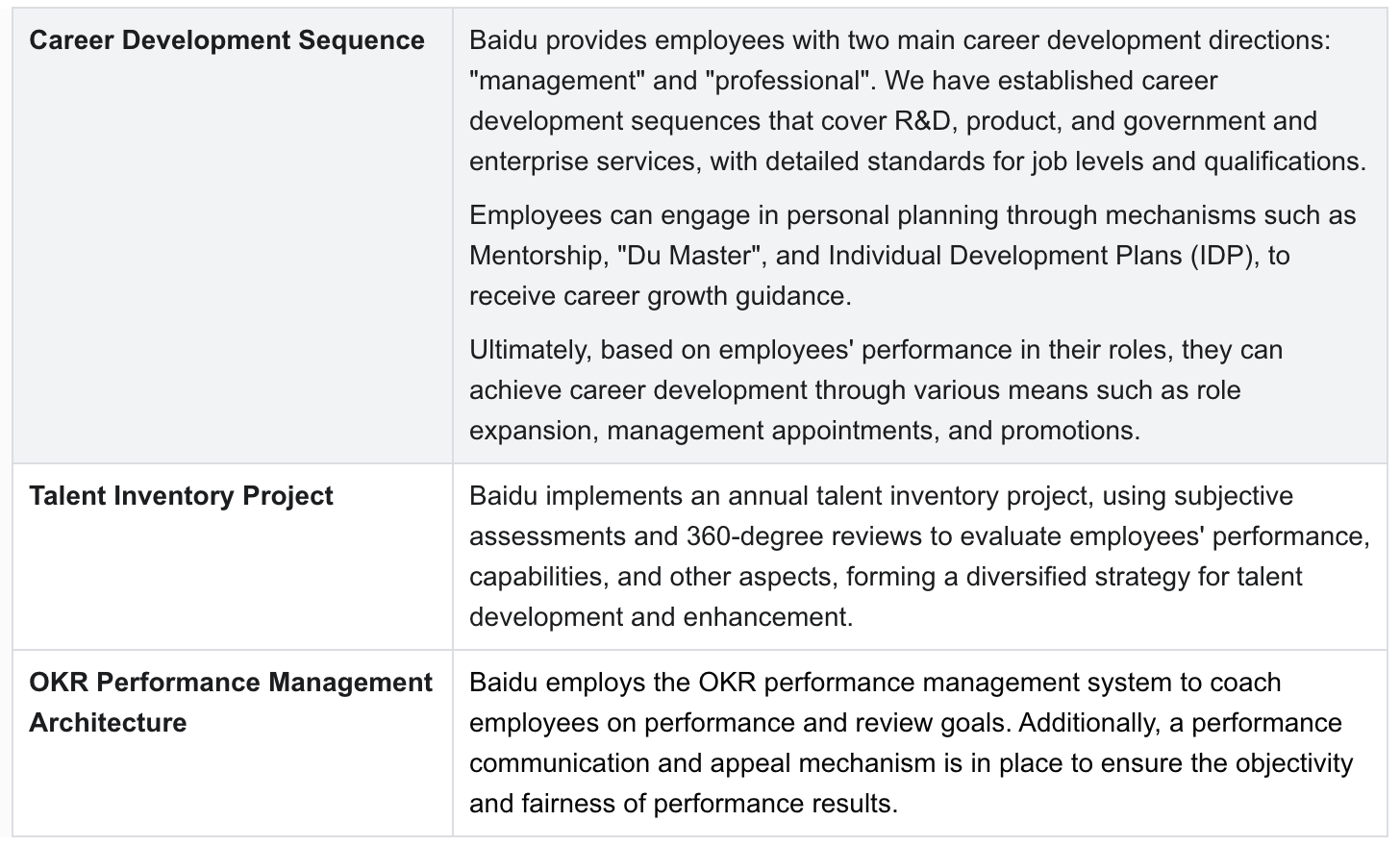
Baidu determines its compensation strategy based on talent strategy positioning. On an individual level, the pay level is determined based on the position and capability level of the individual, with corresponding short-term incentives and salary increases based on performance.
In collaboration with third-party professional institutions, Baidu researches and analyzes outstanding external compensation and incentive events, takingaccount the development of various regions and local consumer spending levels to provide employees with compensation that is competitive externally and fair internally.
Baidu has established a job family management model, which is dividedmultiple job groups (i.e., sequences) based on different requirements of jobs, positions, or capabilities. Each job group is further dividedlarger sequences, smaller sequences, and sub-sequences. An individuals job falls under a specific branch within a job group and is defined by their level of capability within that branch. Different compensation designs are carried out for different sequences and levels, with all sequences featuring performance-based pay, although the frequency of distribution may vary. Additionally, the proportion of the variable part in the overall compensation may differ depending on the position.
Employees who have objections to the compensation and performance can communicate the details through discussions with HRBP or via email. After discussing with the employees supervisor, the HRBP provides objective advice, assesses the reasonableness of the employees claims, and offers timely feedback.
The main process of performance management consists of three parts: goal setting, performance coaching, and performance evaluation. Goal setting is achieved through employees filling out quarterly OKRs (Objectives and Key Results), which should be aligned by employees and managers through communication. Subsequently, managers provide performance coaching to employees, including daily coaching and quarterly OKR reviews. Finally, employee performance is rated based on the employees task performance and contextual performance, takingfull consideration the employees contribution to tasks and the broader impact of their work. This performance evaluation mechanism applies to all full-time employees at Baidus headquarters and branches.
Baidu uses the IMPACT (Chinese name "Business Contribution Degree") concept model for annual performance evaluation. The annual performance evaluation is initiated at the end of each year, mainly assessing employees annual work from two dimensions: task performance and contextual performance. The annual performance evaluation includes five steps: self-evaluation, peer evaluation, line manager evaluation, performance calibration, and confirmation and approval of evaluation results. After the evaluation, the direct manager will communicate with the employee based on the performance evaluation results and help them improve their work performance through a Performance Improvement Plan (PIP). During the performance evaluation process, if there is any significant disagreement with the evaluation results, employees may communicate and appeal according to the performance appeal process.
The impact model also assesses employees' cultural values, including code of conduct, equality and tolerance, and integrity.
Baidu has established effective long-term incentive plans for key talents at or above a certain management level who can create significant value, as well as high-potential talents who demonstrate excellent performance and show good potential for value creation. These incentives include stock options and restricted stock units. Currently, Baidu implements the "2018 Equity Incentive Plan," which complies with U.S. regulatory requirements and discloses basic information such as the number of shares granted, the proportion, and the covered group. The plan mainly targets groups that can contribute to the companys long-term development, covering professional employees at certain levels or above, middle and senior management, and board members. The equity incentive plan is primarily a time-based vesting plan for employees, who can trade their vested shares in the market after receiving them.
Baidu has designed a short-term incentive mechanism for all employees. The intensity of the incentives and the frequency of bonus distribution are tailored according to the characteristics of different sequences and job responsibilities and are flexibly adjusted according to the development of the business. This includes monthly, quarterly, semi-annual, and annual bonuses, with the bonus amount and frequency determined based on the characteristics of different job sequences and responsibilities, ensuring a 100% coverage rate.
Additionally, Baidu has established the "Baidu Top Award" and "Baidu Pride" as mechanisms for rewards and recognition. The "Baidu Top Award," proposed by Baidus Chairman and CEO Robin Li in July 2010, is the highest-level award within the company. It targets grassroots employees below the director level who have made outstanding contributions to the company, encouraging the fundamental spirit of the Internet industry: "small teams make big things happen." It is the highest award given to ordinary employees in Chinas Internet companies, with each winning team receiving 1 million USD. "Baidu Pride" is an important mechanism for recognizing outstanding talents and teams, launched at the end of each year for all employees, aiming to discover individuals and teams that have truly contributed to the company and actively practice Baidus core values of "simple and reliable."
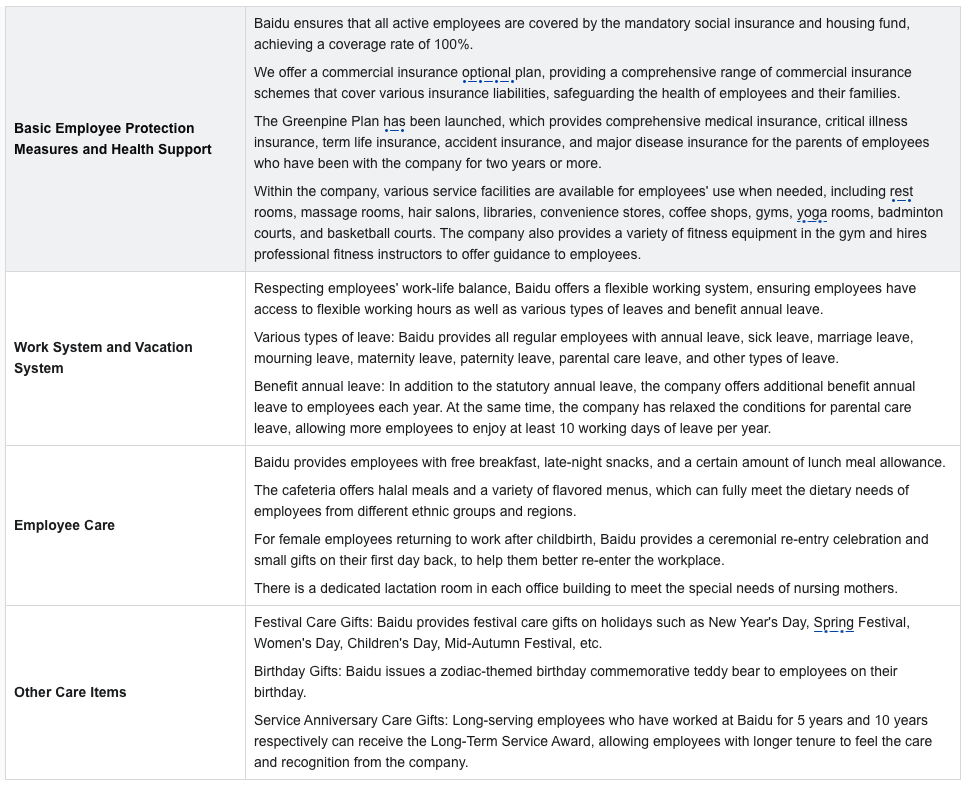
Internally, Baidu has established several rules and regulations, such as the Baidu Specification on Office Management and the Baidu Office Emergency Plan, which are applicable to all Baidu office premises with the aim of ensuring workplace safety.
Baidu Employee Health and Safety Management Measures
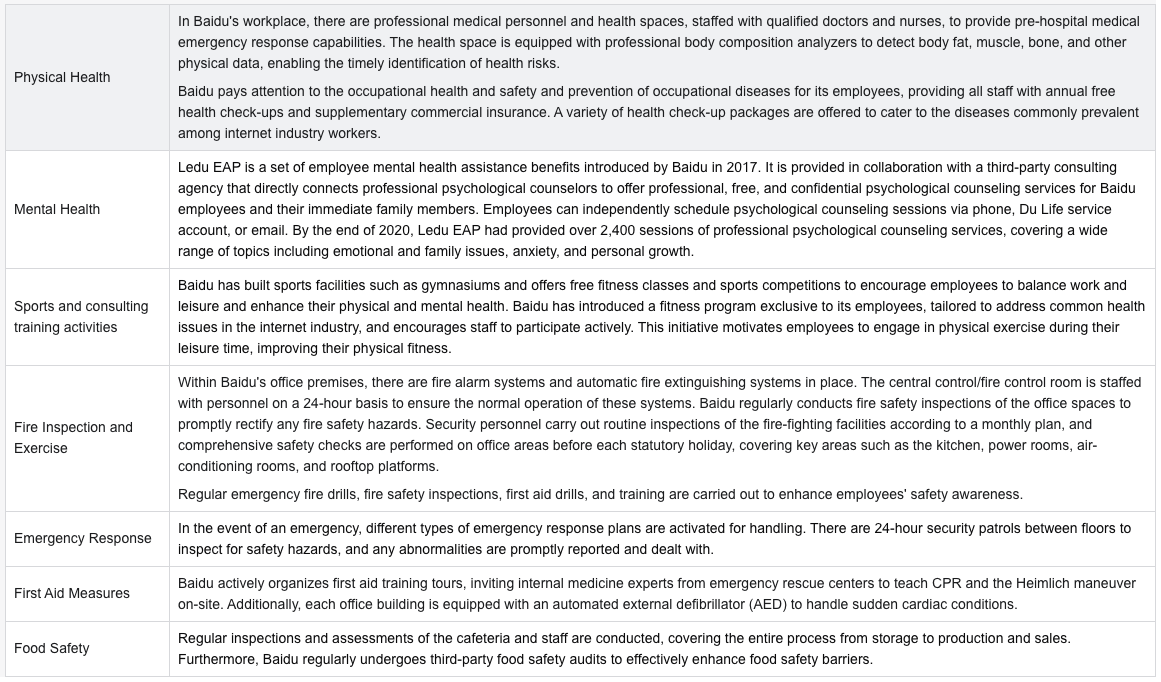
Baidu has set up internal feedback and complaint mechanisms for all employees. Employees can raise their questions or suggestions via email, intranet platform, and other channels, or inform the Human Resources Department via email if they are involved in controversial issues. The person in charge will help the employee contact the relevant person within the prescribed time to discuss the settlement of disputes.
In 2023, Baidu continued to strengthen internal Construction, increase the investigation and punishment of behaviors that violate Baidu's values, and maintain Baidu's clean atmosphere. We handled a total of 68 complaints and cases related to conflicts of Interest, money laundering, and corruption or bribery in 2023.

To understand employee engagement and organizational climate, Baidu conducts a quarterly survey for all employees. Regularly, it makes a comprehensive evaluation of the atmosphere, morale, and sense of mission employees feel within the Baidu organization, reflecting the overall employee engagement. Based on employee feedback, timely insights engagement and organizational climate issues are gained, allowing for prompt improvements in management.
Baidu conducts a quarterly engagement survey. In 2023, Baidu calculates dedication through its integrity index, and engagement index. Based on a maximum score of 5, the overall engagement index for 2023 is 4.49.